

Digital Curation: The Emergence of a New Discipline. Digital Curation: The Emergence of a New Discipline Sarah Higgins 2011, Vol. 6, No. 2, pp. 78-88 doi:10.2218/ijdc.v6i2.191 Abstract In the mid 1990s UK digital preservation activity concentrated on ensuring the survival of digital material – spurred on by the US report Preserving Digital Information (The Task Force on Archiving of Digital Information, 1996) and developed through JISC-funded activities.
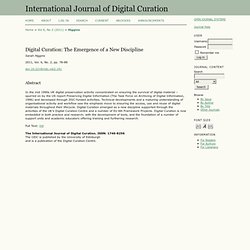
Full Text: PDF. Twitter Acquisition Confirms Curation Is the Future.
» Napster, Udacity, and the Academy Clay Shirky. Fifteen years ago, a research group called The Fraunhofer Institute announced a new digital format for compressing movie files.
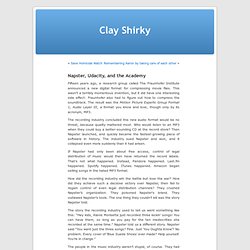
This wasn’t a terribly momentous invention, but it did have one interesting side effect: Fraunhofer also had to figure out how to compress the soundtrack. The result was the Motion Picture Experts Group Format 1, Audio Layer III, a format you know and love, though only by its acronym, MP3. The recording industry concluded this new audio format would be no threat, because quality mattered most. Who would listen to an MP3 when they could buy a better-sounding CD at the record store?
Then Napster launched, and quickly became the fastest-growing piece of software in history. If Napster had only been about free access, control of legal distribution of music would then have returned the record labels. Digital Archaeology: Recovering your Digital History. If you've been using computers for a while, you've probably purchased quite a few devices for storing your work. My family's first computer (a Timex Sinclair 1000 purchased for about $40 in 1984 from our neighborhood grocery store) saved files to an ordinary audio cassette by transferring data over the same sort of cord you might use to connect your iPod to your car stereo.
Since then I've used floppy disks, zip disks, CD-ROMS, DVD-ROMs, and memory sticks, and with each change I migrated most of my important files to the new format. Occasionally though, I, like most computer users, need to access files left behind on obsolete technology. I've written before in various places about the problem this poses for scholars and archivists working with the so-called "born digital" collections in our Library, but many of the tools and techniques I use as a digital curator, I also use to access my own digital history. Curation is the New Search is the New Curation. In the beginning there was curation, and it was good.
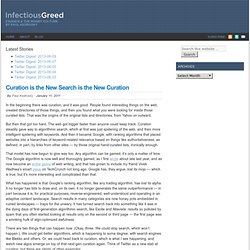
People found interesting things on the web, created directories of those things, and then you found what you were looking for inside those curated lists. That was the origins of the original lists and directories, from Yahoo on outward. But then that got too hard. The web got bigger faster than anyone could keep track. 3 Reasons Curation is Here to Stay. News.geeknerdnetwork.com/?p=2152. Computer Systems Laboratory Colloquium. The 5 Models Of Content Curation. Curation has always been an underrated form of creation.
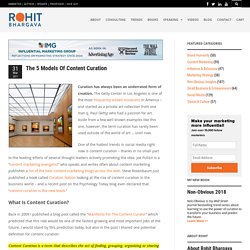
The Getty Center in Los Angeles is one of the most frequently visited museums in America – and started as a private art collection from one man (J. Paul Getty) who had a passion for art. The Birth Of The NewsMaster: The Network Starts To Organize Itself. What Is The Discovery?
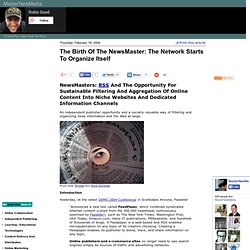
The discovery is the unlimited and yet untapped power we now have to search, filter, aggregate and create focussed news/information channels with the only support of our know-how, culture, experience and a little unknown free technology called: RSS. Where Is The Real Value? The real value is in the fact that the effective widespread application of this filtering and redistribution process would be a highly valuable social endeavour and one that not only can enrich our rapidly evolving global culture but one which can also give sustainability to those who have the will and skill to ride it. Summary: Critical Issues/ Problems At Hand Too much information coming in Too many sources too scan General categorization of sources too limited.
The Filtering Mechanisms Available To Us As Stephen Downes mentions in his beautiful post about networks in his last issue of OL Daily, the network of information needs to organize itself automatically, and we must help it in doing so. 1. Authorship in the Age of the Conducer by Erez Reuveni. Stanford Law School Center for Internet and Society; United States Department of Justice Copyright Society of the USA, Vol. 54, Issue 218, January 2007.

Remix culture. Remix culture, sometimes read-write culture, is a society that allows and encourages derivative works by combining or editing existing materials to produce a new creative work or product.[2][3] A remix culture would be, by default, permissive of efforts to improve upon, change, integrate, or otherwise remix the work of copyright holders.
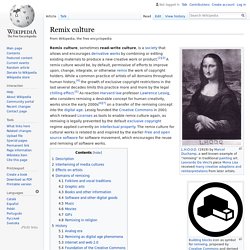
While a common practice of artists of all domains throughout human history,[4] the growth of exclusive copyright restrictions in the last several decades limits this practice more and more by the legal chilling effect.[5] As reaction Harvard law professor Lawrence Lessig, who considers remixing a desirable concept for human creativity, works since the early 2000s[6][7] on a transfer of the remixing concept into the digital age. Lessig founded the Creative Commons in 2001 which released Licenses as tools to enable remix culture again, as remixing is legally prevented by the default exclusive copyright regime applied currently on intellectual property. Digital Curation Google Group. Interesting Google Group on Digital Curation set up a month or so ago, 25 November 2008 to be exact.
Curator Effect. Content Strategy: The Philosophy of Data. Not that familiar with “content strategy?”

That’s ok. It’s in my job title, and I struggle every time I’m asked what I do for a living. Many people have no idea what it means, but even more people bring their own (wrong) assumptions to the conversation. Usually they think it has something to do with writing copy. That’s not entirely false, but it’s kind of misleading.